|
The self-proclaimed egalitarian lifestyle blog, Ezer, recently published a post titled "On Demand Sex Won't Meet Your Husband's Needs," by freelance writer and kindergarten teacher, Bailey, concerning the expectation of "on demand sex" within Christian marriage. Here are my thoughts on this topic, as a natural fertility educator and happy wife of almost twenty years.
In a genuine, loving marriage, one's spouse must be more than a convenient means to one's own pleasure--a perverse state which is in fact, self-love. In contrast, married persons are called to "love, honor and cherish" their spouses--as so beautifully stated in the traditional marriage vows. Elsewhere, Paul encourages Christian husbands to "love their wives as they do their own bodies" and to "nourish and tenderly care" for their wives as they do their own bodies (Ephesians 5:28). The proposed 'selfish' interpretation of this passage from I Corinthians seems strangely at odds with the entire Christian faith, which is one of self-sacrifice, not indulgence. And certainly, a Christian marriage, where husband is called to symbolize Christ, and the wife, His Bride, (cf. Ephesians 5:22-23) must not be self-seeking, but one of mutual love, tenderness, and care. Indeed, Paul tells husbands to imitate Christ who "gave himself up" for His bride (Ephesians 5:25). It is completely incongruous to imagine the same Paul who calls Ephesian husbands to give themselves up, even to the point of death, would here be giving Corinthian husbands carte blanche to indulge themselves in sexual intercourse at whim without concern for the desires of their wives. But what of the end of this passage, where Paul seems to criticize, or at least strongly caution against, the abstinence from sexual intercourse upon which natural family planning methods are based? While I haven't conducted a survey, there is no doubt a wide range of frequency of intercourse between individual marriages. And certainly, depending on the stage of life one is in, within the same marriage over time there will be seasons of frequent intercourse--and seasons of infrequent intercourse. Nonetheless, a loving marriage normally includes the good of intercourse as often as the spouses decide, as a beautiful means of uniting them, and delighting each other, as well as helping to bring children into the world, when they are so blessed. I do not believe that this passage is so much a condemnation or discouragement of natural family planning, so much as an encouragement that spouses not hurt the other by stubbornly refusing sex. My interpretation is based on the inclusion in 1 Corinthians 7:5 of that one important concept: mutual agreement. Any mature marriage will necessarily go through some periods in which sex cannot be a daily (or hourly!) habit, depending on busy-ness, illness, care of small children, work trips or responsibilities, etc. So surely Paul is not saying here that it is inherently dangerous for the couple to refrain from sexual relations from time to time. The concept of "on demand sex" is at odds with the practice of natural family planning, because on demand sex falsely elevates one spouse above the other, who is treated as an object. In contrast, the marriage enriched by the practice of mutual self-restraint calls the spouses to view each other as partners who are at least symbolically co-laboring on the work of building their family, by cooperating with their natures--whether the goal is to conceive a new child, or to avoid pregnancy, or even to accept whatever will come, but with 'eyes open' due to the awareness of the possibility of pregnancy (the vast majority of the time). A word of encouragement: for those with spouses who are at the beginning of this journey of self-mastery--the practice of natural family planning, with its inherent encouragement to cooperate together with the natural rhythms of fertility and infertility (depending on your pregnancy intention) is quite beneficial in encouraging growth in self-control, if freely chosen by both parties. I repeat: it must be undertaken with mutual agreement (as Paul so wisely encourages). Properly understood, I believe that this passage from 1 Corinthians must not to be taken as a license for one spouse to demand sex from the other, but for both spouses to humble themselves to each other, as they grow together in learning to more perfectly express the language of physical intimacy.
0 Comments
What is Ecological Breastfeeding?
It must be noted that ALL breastmilk and any way a mother feeds her baby is good. Whether directly from the breast, from an eye dropper, dripped from a spoon, squirted with a syringe, dribbled out of a cup, or sucked out of a bottle--as the saying goes, "breast is best." The Seven Standards aren't intended to be a measure of whether or not you are "mom enough" (as the now famous TIME magazine cover challenged). There are seven "standards" because ecological breastfeeding is a means of spacing babies. As such, there are rules ("standards") to be followed. If the standards are followed, most women will experience completely natural infertility (for, on average, about 14-15 months after birth) as her body focuses on growing her babe in arms. She will neither ovulate nor menstruate during this time of natural infertility. Until mature eggs are released, there is no chance of pregnancy. As more time passes from birth, the more likely it is that a mother will begin to ovulate again. Studies of ecological breastfeeding mothers have shown that the actual rates of pregnancy are virtually zero from 0-3 months; 2% from 3-6 months, and about 6% after 6 months, assuming the mother has not experienced bleeding or spotting on two or more consecutive days. Eventually, full fertility returns and in the natural order of things, within the context of a normal marital relationship, and with nothing but ecological breastfeeding, babies will come about every two to three years. ...But if natural infertility--babies spaced without charting, abstinence, barriers, medications or devices--isn't something you desire, then ecological breastfeeding isn't for you.
Kippley’s Ecological Breastfeeding Program sets the stage as much as possible for successful breastfeeding. While it is not for every family, it certainly would benefit some families who are unlikely to hear of it. Unfortunately, natural breastfeeding continues to be viewed not only as a countercultural relic of the days of the cave woman, but it is also the best kept secret as a means to naturally space children, even in natural family planning circles.
Am I adding to the guilt? I hope not. My aim is to let mothers and couples know about the most natural form of breastfeeding so they have the option of choosing it, if it is right for them.
Natural breastfeeding moms need to come out of the closet, or more accurately, get out of the house! …and let the world know about this most beautiful way to space babies. To that end, in the coming weeks, I will describe in detail each of Kippley’s Seven Standards and present evidence-based information and personal anecdotes about each of them. I will follow this up with a series of posts explaining what moms, dads, relatives, employees, employers, clergy, and others can do to promote and support breastfeeding within your walls. Make sure to come back in the coming weeks to learn what you can do to encourage the spread of information about natural breastfeeding, to help promote healthier and happier families, mothers, and babies. Or get my posts directly in your email inbox by subscribing to them in the box in the side column of this blog! Photo Attribution
"Kabala mother" by John Atherton - originally posted to Flickr as New baby and proud mother, Kabala, Sierra Leone (West Africa). Licensed under CC BY-SA 2.0 via Wikimedia Commons - http://commons.wikimedia.org/wiki/File:Kabala_mother.jpg#mediaviewer/File:Kabala_mother.jpg
The one and only reason we even knew about attachment parenting in those early days was exposure to these ideas through the Couple to Couple League, the organization that taught us Natural Family Planning. Although CCL has changed, at that time, it was heavily influenced by La Leche League and its teachings about "natural mothering." While CCL wasn't the only voice promoting 'natural mothering,' it was the only one in our circles. While the Couple to Couple League may have distanced itself from "natural mothering," there are now many other voices advocating attachment parenting in general, or aspects of it: notably, Dr. William and Martha Sears, Mothering.com, Dr. James McKenna, the La Leche League, Attachment Parenting International, Dr. Nils Bergman, and Dr. Jack Newman. Notice all the doctors in there? Attachment parenting is no longer the exclusive territory of hippie housewives. (Maybe it never was, but it is good to see all the amazing docs out there finding the research and doing the writing and promoting to support the fact that mothers and babies are meant to be together.) I'm a firm believer that parents have been given, by God, the right and the responsibility to raise their children in the way that seems best to them, in their circumstances, with their unique mix of personalities, resources, community and culture. It saddens me just as much now as it did back then, that simply because I might choose to parent my child a bit differently than someone else, this may somehow be perceived as a judgment against them. I believe that most parents are doing the best they can raising their children, using the information and resources they have.
The Searses teach what they call the seven "b's" of attachment parenting: birth bonding; breastfeeding; babywearing; bedding close to baby; belief in the signal value of baby's cry; beware of baby trainers; and balance. If you are curious about any of these aspects of attachment parenting (or all of it!), what follows is my review of attachment parenting, as used within our family for the past thirteen years. 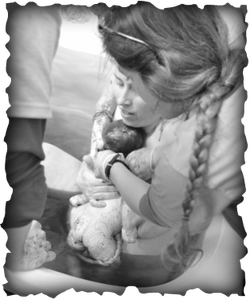 The Joyful Moment just after birth The Joyful Moment just after birth Birth bonding? I've done it six times! This one is pretty well accepted in American society, at least for vaginal births. But in case you've just emerged from subterranean life, bonding at birth makes breastfeeding easier and positively impacts the relationship between mother and baby for years to come, as well as helping to prepare your baby for healthy relationships with others. Having a doula present at your birth and after can be a great resource in helping you bond with baby, both because she can give you helpful bonding tips, as well as run errands so you and your spouse can focus on getting to know your baby. Most articles about birth bonding are quick to point out that missing bonding at birth doesn't doom you to a distant relationship with your child or curse your child to become the next dictator. So what to do if you miss that early bonding? Well, besides this little hug, pictured at the left, I missed early bonding with my little son, who had serious complications at birth and spent his first fifteen days in the NICU, only able to nurse for the first time about a week after birth. I am delighted to say that we both persevered and he's a happy, healthy, exclusively breastfed baby today. The keys to bonding with your baby, despite a delay, are to touch or be near your baby consistently, to talk with your baby, to be responsive to baby's cues, to get good support when your baby is ready to try breastfeeding, and to negotiate with your baby's health care providers for what's important to you, if need be.  Discreetly nursing one of my little ones Discreetly nursing one of my little ones Speaking of breastfeeding, yeah; it's amazing! I LOVE it and have breastfed six babies (in staggered shifts--not all at once!) for over 13 years, with only two breaks of about six weeks each when two of my children weaned at the end of a couple of my pregnancies. Pacifiers have been unnecessary, although I would admit that we've discovered their usefulness in the car with our sixth baby. ;) On the topic of pacifiers, It was the Couple to Couple League who first introduced us to "ecological breastfeeding," or what I call "natural breastfeeding." In a nutshell, natural breastfeeding is nursing your baby without the use of artificial nipples, with responsiveness to baby's cues, day and night. There are advantages to natural breastfeeding, as well as some cons, and this important, neglected topic is one I will address soon in another blog post. If you want tips for getting a good start or need help, attending a local La Leche League meeting is a great idea. I am also available as a peer counselor and experienced nursing mom! 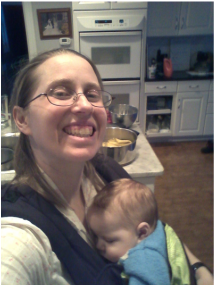 Preparing supper while holding baby! Preparing supper while holding baby! Babywearing? I can't get enough. I have worn my babies in backpacks, slings, frontpacks, and now, my brand new soft structured Boba. It's not only cuddly and sweet to wear your baby, it's the only way a busy mom can get things done, if you choose not to use swings or other baby gear! Here a shout-out to Baby Wearing International is appropriate. BWI has local chapters, including one in the Twin Cities area, where you can go and try on and even check out carriers before investing in them. What works for another mom and baby may not work for you at all, depending on body sizes, baby's age and stage of development and the reason you need or choose to babywear at any particular moment. BWI meetings are also a great opportunity to meet other AP moms, especially if you live in an area where attachment parenting isn't common.  First time I got to hold this sleeper without his feeding tube First time I got to hold this sleeper without his feeding tube Bedding in? I adore cuddling with my sleeping baby or toddler. Our children have been and continue to be consistently great sleepers at night, unless they are sick. Thus far, among our six kids, we have had no bed wetting and no night terrors, including our kids who have graduated from the family bed. And to clear things up--no; we don't continue to sleep with our children forever! The exact age of weaning from the family bed has been different with our various children, but regardless of age, we take as much pride in our children developing night-time independence as we do when they take their first steps, or say their first sentence, or paint their first piece of art.... Night-time independence happens gradually and naturally. Just as a child doesn't go from crawling to walking flawlessly in one day, night-time independence is a gradual process, as the child learns to sleep more deeply, to hold his bladder, how to cope with scary dreams, how to cope with the different sights and sounds of night, etc. It's a lot to learn and we as parents need to be patient and trusting as our children move through this process. Safety concerns? Click on the Dr. McKenna link above. While we do practice the family bed, safe bed sharing is important; and bed sharing is not for everyone. Many people find sleeping with baby in a sidecar arrangement (with a co-sleeper) works better for their family than bed sharing. Concerns about intimacy? We have six kids, people. Need I say more? Responsiveness to baby's cry? Yep. With our first, I responded at the first teeny whimper. Demands on my time are a lot more now than they were then, so it's true that I am not as much of a helicopter mom now as I was then. Yet if I do fail to reach the baby before he is crying, I like to hold him and validate his feelings of fear or sorrow, with words, sounds and body language meant to convey, 'I am here now; you are safe.' 'Beware of baby trainers.' This is simply the old old idea of letting the baby cry it out to train the baby to either stop using crying as a method of communication altogether because nobody is ever going to come, or, more commonly, letting the baby cry it out to train the baby to sleep through the night. Either way, the idea is to let the baby cry without picking up or sometimes even going to the baby. Keeping in mind my statement above about the fact that I truly believe that God gives a particular child to a particular family, and parents need to decide what type of parenting is best for their family, I do take issue with the cry it out strategy because it is rude. I wouldn't simply stand there while an older friend or family member were crying. I would at least attempt to help them or comfort them in some way. I fail to see how ignoring the tears of a very young person is any less rude. Enough said. 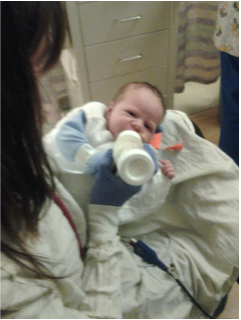 Baby getting his first bottle at age 9 days. Baby getting his first bottle at age 9 days. Finally, balance. This one eluded me till I was debilitated by postpartum anxiety, when we only had little ones in the house. It is hard for us perfectionistic moms to realize the following:
 With my baby and my preschooler asleep on either side, I am grateful especially to Sheila Kippley, one of the founders of CCL, now of Natural Family Planning International, for this quiet moment of beauty. It wouldn't have happened without her. It is my hope that I too can leave a legacy of quiet moments of beauty in the lives of my own children, and in the lives of other families I have been given the privilege to touch, whether in person or through the written word. I would love to hear how AP has influenced your life; contribute to the conversation by making a comment!  I don't usually blog about marriage, but since we Americans celebrate Valentine's Day today, my thoughts have drifted from their typical path of all things baby to romantic love...a straying that I grasp is not really all that far from the 'baby' path. We picture romantic love as Cupid, that mischievous cherub who flies bow in hand ready to let fly his arrows of Eros into the hearts of his unsuspecting victims. The lovers court, and in older versions of the tale, betroth, and in due course, find themselves face to face at the altar, pledging vows that are intended to last until one of them lies in a wooden box at that same altar. This summer, Chris and I will mark our 17th wedding anniversary, God willing. We married young (my sister commented that we looked like we were going to the Prom) and we have grown to middle age together. In those years, we have welcomed six babies into our home, battled pertussis, H1N1, multiple bouts of pneumonia, colic, pre-eclampsia, survived the NICU, lost five babies to miscarriage, moved seven times, paid off all our debts, accumulated more, have lived and still live with toddlers, live with a teen, and had four hundred eighty-nine thousand arguments, give or take...and apologized even more. I am still crazy in love with him, and in his less emotional way, he still loves me too. I hope this resume serves as sufficient life experience to allow you, dear reader, to trust that perhaps I have a little something to say about marriage. When cupid's arrow first penetrates your heart, you are certain that there was never one so perfect as your beloved. We all know this part. But then, in time, it is as if you get out your own bow, pull the arrow from your heart, and turn it against your beloved as a weapon. Where once you were the greatest paramours that the world had ever known, now you have become intimate enemies, noticing his faults with military precision; her vices with the cold-hearted stare of a general on campaign. You let fly your arrows of accusation, blame, bitter resentment, and disappointment. These misdirected arrows have doubtless killed many a marriage. I suspect that we were little different from the rest of the getting-married crowd in that we had no idea what we were getting ourselves into. 'Happily ever after' makes for a beautiful and satisfying conclusion to a fairy tale, but real human beings rarely experience endless happiness following their hand-in-hand departure from the shower of rice. I am an idealist and Chris is a realist. No little time--the unrepeatable currency of life--has been spent trying to reconcile my desires for the perfect (food, education for our children, manner of handling our finances, housing, parenting style, etc.) with Chris's comfort with the less-than-ideal but realistic. (No; we really couldn't buy that house that was $75,000 over our price range.) 'Marriage takes work,' they say. But somehow every starry eyed lover imagines that somehow theirs will escape this unromantic party-pooper truism. Until they meet Disillusionment. Chris and I began teaching classes for married and engaged couples before Chris could shave (well, close anyway). We were so green that every time we got to the Disillusionment part of the teaching notes, I was no little bit baffled. What was this cloudy figure Disillusionment we were supposed to promise that our students would confront? Disillusionment, I am sad to inform, is your neighbor, my dear friends. He is unnaturally tall and bony, and he always wears black. Unnervingly, he never knocks, but appears when you least expect him, right in the heart of your home. He makes himself comfortable, dirty boots planted firmly on your table, while he unthankingly gobbles up your food. He curses, spits, and asks for more. He smokes vile cheap cigars, which leave their stench about the house for hours after his departure. He uses your toilet--with the door open--never flushes and always leaves the seat up. When you least expect it you will find him in your garden, uprooting your most cherished and pampered plant, and will repeat this vandalism, no matter how many times you replant. Yet he is, to borrow a phrase, a severe mercy. If you let him do his work--if you both let him--you will find in time that the neighbor whom you once abhorred becomes a blessing in disguise. You find that he has not, in fact, eaten you out of house and home; no, he has simply devoured your selfish need to have everything done your way. The smoke you once hated has actually fumigated your heart of such loathsome pests as pride and unrighteous anger. Your neighbor's graceless habits have helped you develop patience. And his work in the garden, no matter how many times, clears away a noxious weed that stands in the way of you learning to love the very real and very imperfect spouse whom you actually and truly vowed to love till the day one of you died, no matter what. I get it now. Disillusionment is what happens when the rosy colored glasses are irrevocably smashed. The image of your spouse--the pampered plant sprouted in your head, transplanted in the needy soil of your heart, watered in the intensity of courtship, and fertilized by the heady bliss of your wedding day--is revealed to be nothing but a lovely but terribly false image, whose very existence was always about you and your own selfishness. The 'real' Chris would not require something as quotidian as sleep, but would rise effortlessly and joyfully in the middle of the night to ride off in sub-zero temperatures to purchase craved delicacies for his beloved pregnant wife. He would somehow manage to provide a bounty of financial blessings to effortlessly support an ever-burgeoning family while being home promptly at five every evening to tousle the hair of his first-born son and toss the baby in the air. He would never grow tired, or sick, or angry. He would be ever patient and never notice your impatience. He would happily encourage your habit of working on projects even if you "forgot" to make dinner or change the baby's diaper. He would uncomplainingly lay down whatever he was doing to run out to the store for that little something you forgot. He would forever be taken with your beauty and his passion would be expressed in love songs of praise and painstakingly worded poetry. In other words, he would be all-sufficient provider, humble servant, model husband, perfect father, and ardent lover whenever it suited. Disillusionment, my friends, is what happens when you realize that he (or she for you guy readers) isn't perfect, and that imperfection is never in the ways you expect, or hope for. He will disappoint you and usually in the very things that matter the most to you (that's why you notice). She will fail you. She will misunderstand. In the very ways you try the hardest to show your caring, she will horribly misinterpret and suspect and assume the worst of you and accuse you of selfishness. He (or she) will fail miserably to see his (or her) worst faults, but will somehow have eagle's eyes for yours. This is why there are vows, friends. Because 'for worse' can be pretty ugly. Ladies, it is 100% your responsibility to make your marriage work. Gents, it is 100% your responsibility to make your marriage work. Turn the arrow around. STOP noticing all the big and little ways he (or she) fails to be that false image you cultivated in the soil of your own selfish heart, and point the arrow at yourself. How can you be a better spouse today, this moment, with your next word, in your next breath? That is how happily ever after happens, dear friends. It begins when each one stops expecting the other to make it happen, and takes 100% responsibility for making it happen, not someday, but right here, right now. Love isn't pictured as an arrow in your heart for nothing. Real love will hurt you in a good way. It will transform you and perfect you--both of you. And then you really will live 'happily ever after.' |
Details
Archives
November 2023
Categories
All
Enter Your Email Address to get St. Croix Birth Blog Posts in Your Inbox(We don't collect your email address and you won't get anything else from us.)
|




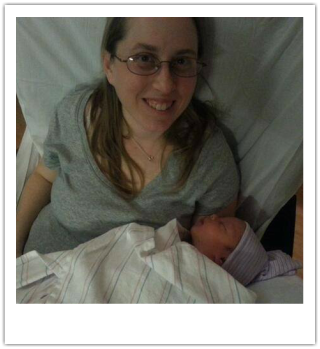

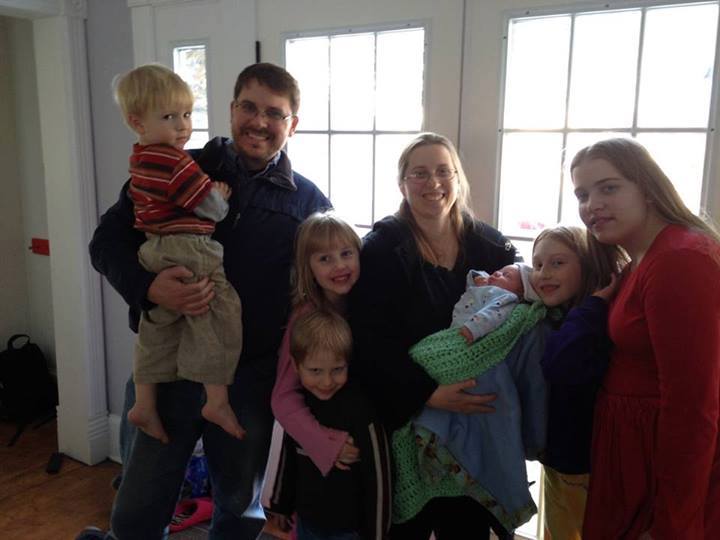


 RSS Feed
RSS Feed